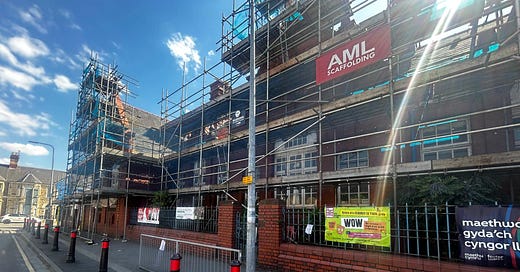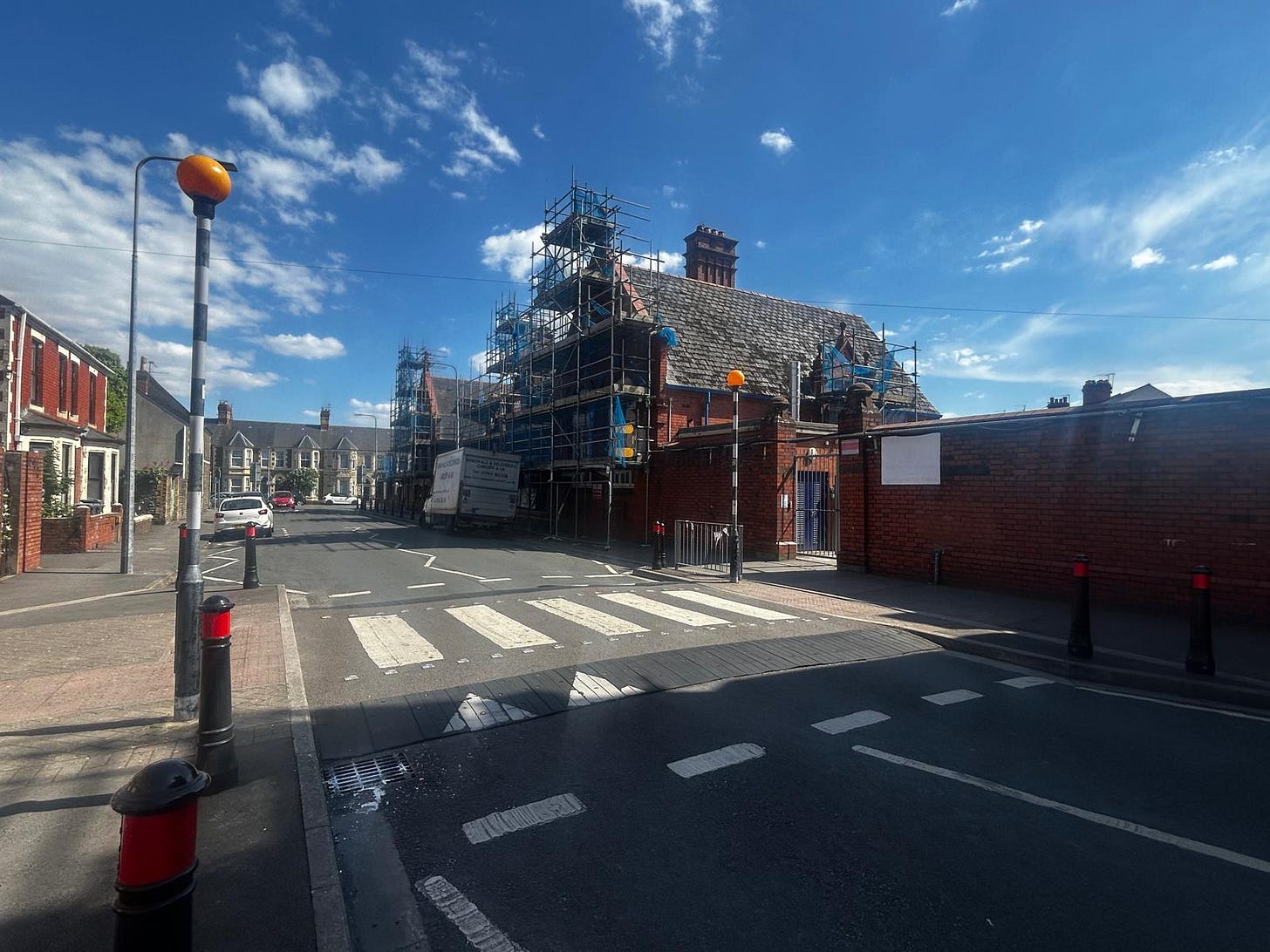Hello,
First things first, welcome to the 300 people who signed up in the last week. You most likely were either lured in by my Guardian column looking at second homes in Wales or because of my reporting on the “car crash” Welsh Tory conference. Or you are the old bloke I got chatting to in Glanusk Services on the A40 while I ate a gammon, egg and chips.
Whether it was homes, Tories or gammon that brought you here, thanks for joining. The whole point of this newsletter is to be the front page of my journalism and help readers better understand Wales. Welcome aboard.
This week we are going to take a look at health in Wales and how a stitch in time can, quite literally, save nine. We will then look at how the Welsh Tories have started to unravel just a week after their “unifying” conference and how a man kicked out of the Labour Party for alleged sexual misconduct is still working for a Labour MS.
Before we go any further a quick word from our fantastic sponsor:
This newsletter is sponsored by Hello Starling. A proudly Welsh company, Hello Starling plan and buy media, backed by data, which is designed to get maximum attention and measurable results. They specialise in getting eyes on your organisation, product and website. If you are looking to get a return on investment, a change in perception, more visitors, more subscriptions, a bigger audience or a happier audience, I highly recommend you check them out here. In doing so you help support this newsletter.
The false economy of cuts
The picture above is of Roath Park Primary School in Cardiff. It is a stunning Victorian grade two building which celebrated its 130th birthday this year. It is a massive community asset.
But this is a Wales wide newsletter which is supposed to be about health. Why am I telling you about this school? Well the reason I mention it is because Roath Park Primary School is a perfect embodiment of the false economy that comes from cuts to public services.
You won’t be able to see the school’s incredible building because the front is covered in scaffolding. Back in 2021 a finial from the roof fell down onto the road in front of the school. Because of this the scaffolding was put up to stop any more masonry from falling. We are now four years later and rather than repair it, the scaffolding is still there.
The reason that the needed repairs haven’t been carried out is that the council doesn't have the budget to do it. So instead the scaffolding remains up.
A freedom of information request has revealed that it has cost over half a million pounds to keep this scaffolding up over this period. In the meantime the state of the school building is visibly deteriorating and the problem is getting worse.
This isn’t just a waste of money. It is also having a really negative impact on the kids and staff. Because of the scaffolding, little light can get through into the classrooms. As one of the former governors for the school Rachel Cable said in letter to the council:
“It is wholly unfair that our children are still having to face the negative impacts of the scaffolding day after day, with low light levels, very cold classrooms, not to mention the space it takes up on the public pavement.”
So we now have children who joined the school in reception and who will be in year five at the earliest before the issue is resolved.
This perfectly encapsulates why it is a false economy to see public services as a “burden” and cuts as a “saving”. Investing in public services is just that, an investment.
We are four years on from the scaffolding going up instead of just repairing the school and the only result of the investment is a substandard learning environment for hundreds of children.
When I approached Cardiff Council a spokesperson pointed out that the school is a Grade II listed building, “which adds significant logistical and legal complexities to the repair process, making it both time-consuming and costly”.
They added:
“The scaffolding was erected as a health and safety measure to protect pupils, site users, and pedestrians from falling masonry. This has allowed us to conduct regular inspections, identifying multiple stonework issues common in buildings of this age. The high cost of the necessary works has been a major barrier to carrying out full repairs and at an estimated £3m, it outweighs the cost of the scaffolding.”
I don’t want to get bogged down looking at one school in the whole of Wales but this statement is rather annoying. The fact that proper repairs would cost £3m and this is more than the £500k “cost of the scaffolding” is a ridiculous argument because that £3m still has to be paid, they have just added half a million quid to the overall cost.
They also pointed out that “across the city we have been dealing with multiple priority repairs spending over £110m in the past five years” and “we are keen to resolve the repair issues at Roath Park Primary as soon as possible and that “works are planned, which will allow us to remove the scaffolding”. Fingers crossed that kids won’t go through their entire primary education unable to see through a window.
So what has this got to do with the health service? Well I have covered the Welsh NHS for many years now and have regular conversations with people at all levels across Wales’ seven health boards.
In my view, there is no better analogy for the Welsh NHS than seeing it as an enormous Grade II listed building which is entirely held up by scaffolding to stop it falling apart and killing people. Only difference is, that in the health service, the scaffolding itself has been up for so long that it is rusted to the point that decision makers are now spending resources fixing the scaffolding, rather than the original problems.
This is best illustrated through the Cardiff and Vale, and Betsi Cadwaldr health boards
Patient critical roles deliberately being left unfilled
For years, the North Wales health board of Betsi Cadwaldr has been the basket case of the Welsh NHS. For a decade it has been in special measures (except when it was apparently expedient to briefly take it out just ahead of the last Senedd election). There is no doubt that the people of North Wales have been uniquely shortchanged when it comes to healthcare over the last 10+ years.
However this isn’t to say that other parts of Wales have been shining lights in health governance. But there is one which is apparently on a very slippery slope. I have had conversations with very well placed staff within Cardiff and Vale Health Board and it is bleak.
I have been told that:
“Several patient critical roles are currently not being filled because of a freeze in recruitment”
The chief executive has been holding several meetings with large private professional services companies over how the health board could be restructured with hundreds of jobs going
I have spoken to managers who say that roles which are vital for patient care are simply not being filled with jobs not being allowed to be posted. They say that there has been little communication about how long this will go on for and it makes future planning all but impossible.
As one Cardiff and Vale manager told me:
“The thing that comes through every conversation or new revelation about the state of the health board is that finance is the focus now not patients”
When I asked C&V about this recruitment freeze they said:
"The Health Board is required to manage its population's health needs within the resource allocated to it by Welsh Government. The size and scale of the financial challenge has resulted in the need to review roles at all levels, including patient facing roles.
“Every role undertakes two layers of scrutiny, at Clinical Board level and at Executive level on a range of criteria including quality and safety. Quality of care and safety for patients remains our priority and this will not be compromised.”
I am sorry but it is simply not true to say patient care isn’t being compromised. It is. Every day. Staff and patients on the ground tell me that this is having a direct impact on their ability to properly care for patients.
With regard to their plans to bring in an external company to reshape the health board a spokesperson said:
“It is not unusual for large, complex organisations to seek independent and external expertise to support senior leaders in organisational redesign so that we can be successful in the delivery of the Health Board strategy. This is not something that has been confirmed but has been explored as an option.
“We acknowledge that this is unsettling for colleagues, and we will do everything possible to involve them and communicate the changes to the Health Board in difficult times.”
So what will this restructure look like? I have been told that there are conversations about delayering with the number of jobs to be lost in the senior grades in the next two years now stated to be 800. Not a small number.
While it is appealing for certain politicians to talk about “removing middle managers” I would invite you to think about the school with the scaffolding. Simply cutting and cutting leads to more costs further down the line.
We need a wholesale change to how we deliver healthcare (and prevent sickness in the first place) rather than continuing to gut a building which is already being propped up to stop it collapsing.
Of course, getting an external consultant for a restructure could be part of that wholesale change. But there are several reasons I am hugely sceptical of this for two reasons:
They are only now exploring the idea of external consultants. They have already announced the restructure. This smells very much like a panicked afterthought than a planned realignment.
The scale of change needed likely can’t be driven by one health board. In Cymru we need a total shift in healthcare delivery from secondary to primary care with other government departments driving towards this goal. This drive can only come from the Welsh Government and I am hugely sceptical that any individual health board could make these changes alone.
This leads us on to..
Eluned Morgan and the longest waiting lists target
Speaking to this newsletter back in December Eluned Morgan exclusively revealed her target for waiting lists. At the time there were over 24k waits of over two years on the Welsh NHS while England had none. She told me that by the spring she hoped that by the spring that figure would be down to “around 8,000”.
Well last week it was announced that figures for March showed that the amount of the longest waits had fallen to 8,389. So she was just above it.
Opposition parties have claimed this is a missed target. I would make the argument that this is “around 8,000” and therefore she hit her target.
Frankly I don’t think it matters either way if the target was technically hit. I commend the Welsh Gov and the staff involved for making such progress (I didn’t think they would hit it) these are just a few very tentative steps on a much longer road. There are still nearly 800k open pathways in the Welsh NHS (up from 463k in January 2020). If your whole house is on fire you can’t stop to celebrate that you have put it out in the utility room.
This graph really does illustrate how quick the fall in the longest backlog has been:
However I think what is most interesting is if we start to look at it based on health boards:
As you can see from this Betsi and Cardiff & Vale are the healthboards with the longest backlog remaining. Now you may be thinking “of course they are, they are the largest”. Fair comment but at present they account for 83% of the longest waits while covering just 37.13% of the population.
What this means for human beings
I have thrown a lot of data at you so I think it is worth taking a second to think about what the pressures within the Welsh NHS means for staff and patients. I particularly want to look at the problem of corridor care.
RCN Wales and BMA Cymru Wales have recently launched a campaign to end corridor care in Welsh hospitals. You can actually sign their petition here.
They have collated some anonymous testimonies of corridor care from doctors and nurses working in hospitals across Wales.
Here are just some of them:
“I have seen patients where diagnoses have been missed due to inadequate places to examine them”
“Multiple patients with severe injuries to bones are sitting in chairs waiting for beds for 48 to 72 hours in best case scenario”
“There are patients who are damaged by this that never go home because they deteriorate so much during their ‘corridor care’.”
“Patients who are in the waiting room or in the corridor often don't have access to basic facilities such as water, food and toilet access. This is particularly problematic for frail elderly patients or those with dementia.”
“We regularly have patients on cardiac monitors in chairs in corridors. It’s a regular occurrence for patients to have seizures on chairs”
“A patient was sat in a waiting room, when they should have been on a bed. They collapsed and died in the waiting room. Unfortunately, this is not something that’s uncommon.”
“Community hospitals used a dining area for patient care – these areas have no piped oxygen or suction”
These quotes speak for themselves. We have had a decade and half of relying on scaffolding in the name of saving money. This is where patching leaks gets you.
Welsh Tory leader makes another gaffe and a big questions for a Labour MS
Keep reading with a 7-day free trial
Subscribe to The Will Hayward Newsletter to keep reading this post and get 7 days of free access to the full post archives.








